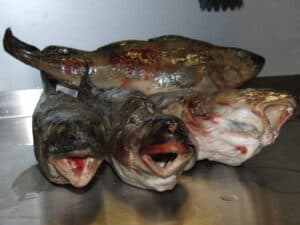The biodiversity of eggplant is large and probably the largest in India with over fifty varieties. In India, eggplant is called brinjal (Solanum melongena). Brinjal which is cultivated is divided into three types. Round and egg-shaped eggplant is of S. melongena var. esculentum. Long elongated forms are of S. melongena var. serpentinum and dwarf Brinjal are of S. melongena var. depression. In addition to the edible cultivated varieties, there are many different types of eggplant that grow wild. Brinjal is an affordable, healthy, and very important part of the Indian diet. Brinjal is a significant source of income for between one and two million small farmers in India. A fourth of the world's production of aubergine is in India. China produces more than half of the world's eggplant.
The great diversity of aubergine types in India is due to developments which over a very long time have valued brinjal as very important. In contrast, Bt-Brinjal from Monsanto was introduced in 2009. Monsanto colonizes agriculture with their insect and herbicide resistant crops until they own the entire agricultural market with their patented invention. In this case, it is Bt-Brinjal with inserted toxin from the bacterium B. thuringiensis that will win Bt-Brinjal territory. India has been quick to protect its natural treasures and has sued Monsanto for pirating their natural treasures and then altering their genetic integrity through illegal genetic modification.
Bt-Brinjal is genetically modified eggplant that was introduced by manufacturers Monsanto and Cargill to India in 2009. This genetically modified eggplant contains inserted Cry1Ac gene. This bacterial gene originates from the bacterium Bacillus thuringiensis. It is inserted into genetically modified crops such as cotton and maize to give the crops resistance to larvae of Lepidoptera pests. Brinjal eggplant is also damaged by Lepidoptera pests, mainly by the Brinjal fruit and plant shoot borer (Leucinodes orbonalis). Bt-Brinjal is also toxic to Brinjal fruit borer (Helicoverpa armigera). Bt-Brinjal has inserted Cry1Ac gene to form toxin against the larvae of these moths. Bt-Brinjal (Cry1Ac eggplant) is toxic to the moth larvae that will eat it. 16-17 mg Bt insecticide/kg aubergine has been measured.
There are many different plant pests that threaten Brinjal and of these the fruit-boring caterpillars are the cause of approx. 10% losses. Where proper prevention is carried out in the orchard with Brinjal, this is reduced to 4% loss. It is clear that for many farmers in India, genetically modified Bt-Brinjal is of little economic interest. For the producer of Bt-Brinjal, these themselves are probably of little interest. Many are therefore concerned that Bt-Brinjal's economic development could be like that of genetically modified cotton in India. This means that inflicted economic ruins, from a combination of excessively high increased costs of Bt-Brinjal as well as loss of crops due to other bad conditions, can kill a great many farmers who have lost everything by betting everything on GMOs.
Bt-Brinjal has been crossed by the producer with different varieties to be able to perform in all three different market sectors. It is illegal to grow Bt-Brinjal in India. In contrast, Bt-Brinjal has been allowed in Bangladesh. There are several cases of better selling prices for Bt-Brinjal in Bangladesh. Crops that could previously suffer 20-40% losses from insect damage now require less spraying with insecticides. Farmers in Bangladesh have grown GMO Bt-Brinjal varieties and sold seeds from the crops. This can spread Bt-Brinjal to farmers and makes it more popular and profitable in the short term.
Links:
How India squared up to Monsanto's 'biopiracy'
Bangladeshi farmers caught in row over $600,000 GM eggplant trial
References:
Evdokimov AG, Moshiri F, Sturman EJ, Rydel TJ, Zheng M, Seale JW, and Franklin S. 2014. Structure of the full-length insecticidal protein Cry1Ac reveals intriguing details of toxin packaging into in vivo formed crystals. Accelerated communications. The protein society. DOI: 10.1002/pro.2536



